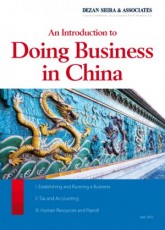Update: Latest Guidance Catalogue for Foreign Investment Industries Released
By Rainy Yao
SHANGHAI—On March 10, the much anticipated “Catalogue for the Guidance of Foreign Investment Industries (2015)” was jointly released by the National Development and Reform Commission (NDRC) and the Ministry of Commerce (MOFCOM). The Catalogue will enter into force on April 10, 2015.
The Guidance Catalogue is comprised of encouraged, restricted and prohibited lists. Foreign companies that are engaged in the encouraged industries may enjoy preferential policies such as tariff exemptions for imported equipment, or tax incentives. For industries that are listed as restricted, investors often need to get pre-approval from the government. Some of these sectors may also have a limit on the number of shares of a foreign entity may own. For industries not included in the catalogue, foreign investors only need to complete filing procedures with the local government.
The latest draft version of the investment catalogue was released in November 2014. Several slight changes have been made since then, but most of the changes introduced in the 2014 draft have made it into the 2015 document now going into force.
The final version lifts restrictions on service industries such as accounting and auditing, legal consulting and market survey, while it encourages foreign investment into R&D in the fields of medicine and technology. Following our previous article on the release of the draft document, we provide a summary of major changes compared to both the 2014 draft and the previous regulation.
Encouraged Industries
One thing that stands out is that foreign investors are now encouraged to set up and operate wholly foreign-owned nursing homes. The Chinese government released a set of rules last year to encourage the development of elderly care industry in the country, with tax incentives and subsidies provided for both domestic and foreign-owned nursing homes.
While accounting and auditing is also included in the encouraged list, the final version now specifies that foreign-invested accounting firms are required to have a Chinese national as their main partner.
![]() RELATED: 2011 Foreign Investment Industrial Guidance Catalogue Promulgated
RELATED: 2011 Foreign Investment Industrial Guidance Catalogue Promulgated
Restricted Industries
Most restrictions on manufacturing, wholesale and retail trading and real estate have now been lifted. A total number of 41 restricted items have been removed from the 2011 list.
The new Catalogue now allows foreign investors to set up telecommunications companies to provide basic telecommunication services and value-added telecommunication services (VATS). The foreign entity may own up to 50 percent of shares in enterprises providing VATS and up to 49 percent in providing basic telecommunication services. Crucially, all equity restrictions on e-commerce enterprises have been lifted, which means that as of April 2015, foreign entities are allowed to invest in and set up enterprises that engage in e-commerce.
Foreign investors will soon also be allowed to set up foreign-invested hospitals with a Chinese partner.
As largely laid out in the 2014 Draft Version, the finance industry will largely be liberalized. For more details on the lifting of these restrictions, please refer to our previous article.
On the other hand, new restrictions have been added to the education, culture and entertainment industries, as well as the conducting of market surveys.
Whereas the 2011 Catalogue only restricted foreign investment in Chinese high schools, restrictions now extend to pre-school and tertiary education. In all these cases, the education institution must be a joint venture with a Chinese party. In addition, the school must be “led by a Chinese party,” meaning that the headmaster or the chief administrator in a foreign-invested education institution must be Chinese nationals. The Chinese party must account for half of the members in the board of directors or the joint management committee.
The restrictions on culture and entertainment industry, while originally removed from the 2014 Draft version, were however maintained in the final version now coming into force, specifically:
- Printing of publications (Chinese party as majority shareholder)
- Construction and operation of theaters and cinemas (Chinese party as majority shareholder)
- Construction and operation of large theme parks (government pre-approval)
- Performance brokerage institutions (Chinese party as majority shareholder)
As for conducting market surveys, foreigners now need to have a Chinese controlling partner to conduct audience measurement (e.g. radio listenership and television viewership). In the 2011 Catalogue, foreign investors are allowed to act as the controlling shareholder in JVs to conduct all types of market survey.
![]() RELATED: Further Liberalization for E-commerce in the Shanghai FTZ
RELATED: Further Liberalization for E-commerce in the Shanghai FTZ
Prohibited Industries
The revised Catalogue also introduces several new prohibitions on foreign investment, including:
- Production of genetically modified plant seeds
- Processing of petroleum and coking
- Processing and production of nuclear fuel
- Sale of tobacco
- Chinese legal consulting (exclude providing information relevant to Chinese legal environment)
- Operation of antique stores and auction houses selling Chinese cultural relics
- Operation of theater line companies
- Production of sound and video recordings and electronic publications
The list has not yet clarified the definition of “information relevant to Chinese legal environment.” Another notable point is that “production of sound and video recordings and electronic publications” was previously removed from the prohibited list in the 2014 Draft Version.
To learn more about the consequences of these regulations for your business, please contact us at china@dezshira.com.
A Chinese version of the new Catalogue can be found here.
|
Asia Briefing Ltd. is a subsidiary of Dezan Shira & Associates. Dezan Shira is a specialist foreign direct investment practice, providing corporate establishment, business advisory, tax advisory and compliance, accounting, payroll, due diligence and financial review services to multinationals investing in China, Hong Kong, India, Vietnam, Singapore and the rest of ASEAN. For further information, please email china@dezshira.com or visit www.dezshira.com. Stay up to date with the latest business and investment trends in Asia by subscribing to our complimentary update service featuring news, commentary and regulatory insight. |
![]()
 Doing Business in China
Doing Business in China
The China Briefing Business Guide to Doing Business in China is the definitive guide to one of the fastest growing economies in the world, providing a thorough and in-depth analysis of China, its history, key demographics and overviews of the major cities, provinces and autonomous regions highlighting business opportunities and infrastructure in place in each region.
 Adapting Your China WFOE to Service China’s Consumers
Adapting Your China WFOE to Service China’s Consumers
In this issue of China Briefing Magazine, we look at the challenges posed to manufacturers amidst China’s rising labor costs and stricter environmental regulations. Manufacturing WFOEs in China should adapt by expanding their business scope to include distribution and determine suitable supply chain solutions. In this regard, we will take a look at the opportunities in China’s domestic consumer market and forecast the sectors that are set to boom in the coming years.
 E-Commerce in China
E-Commerce in China
In this issue of China Briefing Magazine, we cover the current laws pertinent to the e-commerce industry in China, as well as introduce the steps involved in setting up an online shop in the country in order to help provide foreign investors with an overview of the e-commerce landscape in China.
- Previous Article China & Asian Human Resources – Sharing Talent Across Borders
- Next Article Managing Your Accounting and Bookkeeping in China – New Issue of China Briefing Magazine










